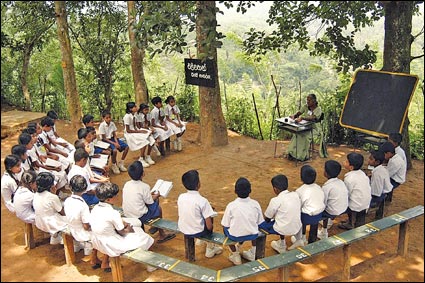Expansion of education in Sri Lanka
Ven. Dr. T. Dhammaratana
Many scholars wrote on the subject of colonial education system in
Ceylon, pointing out the structure of education under colonial vision.It
is well-known that the system of schools was introduced to Ceylon on the
recommendation of the Colebrooke Commission which set up by the British
Administration in 1829-32, to investigate colonial Government in Ceylon,
and also to make recommendations on other areas of development such as
administration, financial and economic issues, and judicial re-form.
Recommendations
As a result of the positive recommendations of the above Commission
the Ceylon inherited to form the first Constitutional Government with a
modernization of traditional economic system in the country by
introducing a uniform system of justice, education and civil
administration. As a follow up, the recommendations of
|

Education for all, free education as a tool of empowerment. File
photo |
the Commission, the modern school system was introduced to the island
in 1836. The main objectives of colonial education system were to
prepare a small number of administrators to run colonial policies in and
out of the country.
That is why, on the occasion of the official inauguration of
Peradeniya University in 1954, in the presence of the Queen Elizabeth
II, the Duke of Edinburgh concluded his opening speech saying that “You
have remarked Chancellor, that it is not easy to open a University,
because once established it is always open. However, like the
shopkeepers of London during the bombing, I can declare this place to be
more open than usual....”
The above concluding remark of the Duke of Edinburgh, one can
interpret the country has been opened to the world, to develop its
intellectual culture in promoting higher education and research, to
share educational experience worldwide, and doors were opened to
citizens of Ceylon in creating Sri Lankan elite generation to stand up
among world community.
Thanks to the leaders and elites of our country, who have been
committed with deep understanding the necessity in expanding national
education system for the better interest of the nation by providing
their vision, guidance and courage in creating several commissions and
strategies to upgrade the existing education system in Sri Lanka from
time to time.
Ancient record
It is worthy to note that Sri Lanka had an unbroken education history
with the introduction of Buddhism, culture and education system by
Arhant Maha Mahinda, the son of the great Buddhist Emperor Asoka of
India in the Third century B.C. Since then, after creating the
Mahavihara in the ancient capital of Anuradhapura, the great seat of
learning in ancient Island of Tambapanni, made a record in human
history.
Traditional education
It is evident that the Mahavihara in Anuradhapura even established
its affiliated learning institutions in South East Asia. Therefore, Sri
Lankan civilization inherited such traditional education from the
ancient elite lineage of Taksashila and Nalanda universities in ancient
India, which were recognized as foremost learning institutions in human
history.
Even today, such traditional education system maintains under the
education system of Pirivena, which has been benefited by our most of
senior scholars in the country.
The history has changed the tradition, politics and other environment
of the life system of our country after invasions of foreign powers.
Among them, Portuguese, Dutch and English domination have been trying to
introduce their culture, religion and education to the nation. However,
as a result of domination of Sri Lanka by foreign invaders, the country
faced many challenges in the education sphere for several centuries.
Education reforms were headed by then Education Minister Dr. C.W.W.
Kannangara (1884-1969), establishing free education system and Maha
Vidyalaya or Central Colleges in all districts including rural areas to
provide education to all in the island.
By following the State Council Ordinance in 1939, it has been given
powers to the Executive Committee of Education to exercise its
legitimacy to create new regulations in establishing a new system which
was expected to ensure that education was provided with equal
opportunities to all children irrespective of their social class,
religion, economic condition and ethnic origin. In addition to that, a
Special Commission was created by Kannangara in 1942 under his
Chairmanship, to investigate real status of education in the nation.
The Committee gave lasting value to the nation and a promising future
of education. Its report was published in 1943 with following
priorities: (a) education should be free from the kindergarten to the
University (b) Mother tongue should be used as the medium of instruction
in primary schools (c) English should be taught in all schools from
Standard III (d) A curriculum for the child which would develop its
“head, heart and hands” should be introduced.
By turning a new leaf in the education history of Sri Lanka,
Kannangara implemented recommendations and re-formed the existing
colonial education system in 1945.
Changing point
It opened doors to each child enabling them to reach to the highest
position in education even to be the Head of State. Since then,
succeeding Governments continued to expand the education system from
elementary to higher education by establishing Universities in every
corners in the island.
Recent statistics show that there are 9,830 public schools serving
4,030,000 students, 19 Universities in the island have been established
to develop an intellectual culture in the country. Besides, several
institutes of technological studies and Post-Graduate Autonomous
Institutes and 561 Pirivenas are serving the entire education system. In
the beginning of the 20th Century the world vision has changed as a
result of globalization.
To be continued |



